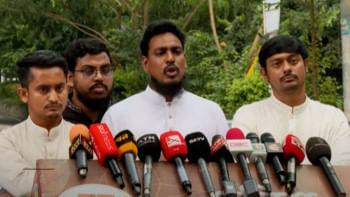Annisul Huq elected FBCCI president

Annisul Huq, the FBCCI president-elect, and MA Rouf Chowdhury, the leader of the rival panel, shake hands in Dhaka yesterday. Rouf proposed Annisul's name instead of vying for the top post.Photo: STAR
Annisul Huq was elected president unopposed of the Federation of Bangladesh Chambers of Commerce and Industry (FBCCI) yesterday, as MA Rouf Chowdhury proposed Annisul's name instead of vying for the post.
Prior to the FBCCI polls, Rouf had declared his candidature for the top post of the apex trade body.
Newly elected directors Abul Kashem Ahmed and Abu Alam Chowdhury have also been elected first vice-president and vice-president unopposed, as their rivals Golam Dastagir Gazi and Obaidur Rahman withdrew their candidatures at the eleventh hour.
FBCCI Election Board Chairman Professor Ali Ashraf made the official announcement of the office bearers of the FBCCI at Federation Bhaban in Dhaka yesterday.
Expressing his reaction, Annisul, nominated director from the Bangladesh Garment Manufacturers and Exporters Association (BGMEA), said by proposing his name as the chief of the federation Rouf has made an example not only for the business community but also for the political leaders.
“We have a great task to do in the coming days,” he said.
The FBCCI president-elect also said the fair and transparent election of the FBCCI will cast a positive impact on the country' national elections.
Assuring his support to the new office bearers, Rouf, also newly elected director, said, “We should work together for the country's business community as well as economy.”
The two vice presidents Abul Kashem and Abu Alam also spoke.
Earlier, the biennial election to the FBCCI was held on Monday where Annisul-led panel secured a landslide victory bagging 19 posts of director out of 24. Rouf-led panel got only five directors' seats.
In the chamber group, Annisul's panel clinched 11 directorship out of 12, while Rouf's panel got only one and in the association group, Annisul-led panel won eight posts of director out of 12, while Rouf-led panel got the rest four.
There are 24 directors -- 12 each from chamber and association groups -- who are elected through direct balloting in first phase, and 14 other directors -- seven each from the leading chamber and association groups -- who are nominated by respective chambers and associations. The 38 directors elected a president and two vice-presidents in the second phase, for a two-year term.

 For all latest news, follow The Daily Star's Google News channel.
For all latest news, follow The Daily Star's Google News channel. 



Comments